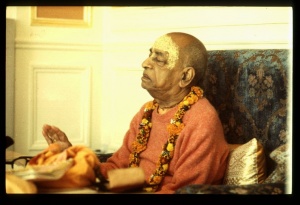CC Adi 12.49: Difference between revisions
m (1 revision(s)) |
(Vanibot #0054 edit - transform synonyms into clickable links, which search similar occurrences) |
||
| (One intermediate revision by one other user not shown) | |||
| Line 1: | Line 1: | ||
{{ | [[Category:Sri Caitanya-caritamrta - Adi-lila Chapter 12|C049]] | ||
<div style="float:left">'''[[Sri Caitanya-caritamrta|Śrī Caitanya-caritāmṛta]] - [[CC Adi|Ādi-līlā]] - [[CC Adi 12|Chapter 12: The Expansions of Advaita Acārya and Gadādhara Paṇḍita]]'''</div> | |||
<div style="float:right">[[File:Go-previous.png|link=CC Adi 12.48|Ādi-līlā 12.48]] '''[[CC Adi 12.48|Ādi-līlā 12.48]] - [[CC Adi 12.50|Ādi-līlā 12.50]]''' [[File:Go-next.png|link=CC Adi 12.50|Ādi-līlā 12.50]]</div> | |||
{{CompareVersions|CC|Adi 12.49|CC 1975|CC 1996}} | |||
{{RandomImage}} | |||
==== TEXT 49 ==== | ==== TEXT 49 ==== | ||
<div | <div class="verse"> | ||
prabhu kahe—bāuliyā, aiche kāhe kara | :prabhu kahe—bāuliyā, aiche kāhe kara | ||
ācāryera lajjā-dharma-hāni se ācara | :ācāryera lajjā-dharma-hāni se ācara | ||
</div> | </div> | ||
| Line 12: | Line 16: | ||
==== SYNONYMS ==== | ==== SYNONYMS ==== | ||
<div | <div class="synonyms"> | ||
prabhu | ''[//vanipedia.org/wiki/Special:VaniSearch?s=prabhu&tab=syno_o&ds=1 prabhu] [//vanipedia.org/wiki/Special:VaniSearch?s=kahe&tab=syno_o&ds=1 kahe]'' — the Lord said; ''[//vanipedia.org/wiki/Special:VaniSearch?s=bāuliyā&tab=syno_o&ds=1 bāuliyā]'' — one who does not know what is right; ''[//vanipedia.org/wiki/Special:VaniSearch?s=aiche&tab=syno_o&ds=1 aiche]'' — in that way; ''[//vanipedia.org/wiki/Special:VaniSearch?s=kāhe&tab=syno_o&ds=1 kāhe]'' — why; ''[//vanipedia.org/wiki/Special:VaniSearch?s=kara&tab=syno_o&ds=1 kara]'' — do; ''[//vanipedia.org/wiki/Special:VaniSearch?s=ācāryera&tab=syno_o&ds=1 ācāryera]'' — of Śrī Advaita Ācārya; ''[//vanipedia.org/wiki/Special:VaniSearch?s=lajjā&tab=syno_o&ds=1 lajjā]'' — privacy; ''[//vanipedia.org/wiki/Special:VaniSearch?s=dharma&tab=syno_o&ds=1 dharma]'' — religion; ''[//vanipedia.org/wiki/Special:VaniSearch?s=hāni&tab=syno_o&ds=1 hāni]'' — loss; ''[//vanipedia.org/wiki/Special:VaniSearch?s=se&tab=syno_o&ds=1 se]'' — that; ''[//vanipedia.org/wiki/Special:VaniSearch?s=ācara&tab=syno_o&ds=1 ācara]'' — you act. | ||
</div> | </div> | ||
| Line 19: | Line 23: | ||
==== TRANSLATION ==== | ==== TRANSLATION ==== | ||
<div | <div class="translation"> | ||
Lord Caitanya Mahāprabhu instructed Kamalākānta, “You are a bāuliyā, one who does not know things as they are. Why do you act in this way? Why do you invade the privacy of Advaita Ācārya and damage His religious principles? | Lord Caitanya Mahāprabhu instructed Kamalākānta, “You are a bāuliyā, one who does not know things as they are. Why do you act in this way? Why do you invade the privacy of Advaita Ācārya and damage His religious principles? | ||
</div> | </div> | ||
| Line 26: | Line 30: | ||
==== PURPORT ==== | ==== PURPORT ==== | ||
<div | <div class="purport"> | ||
Kamalākānta Viśvāsa, out of his ignorance, asked the King of Jagannātha Purī, Mahārāja Pratāparudra, to liquidate the three-hundred-rupee debt of Advaita Ācārya, but at the same time he established Advaita Ācārya as an incarnation of the Supreme Personality of Godhead. This is contradictory. An incarnation of the Supreme Godhead cannot be indebted to anyone in this material world. Caitanya Mahāprabhu is never satisfied by such a contradiction, which is technically called rasābhāsa, or overlapping of one humor (rasa) with another. This is the same type of idea as the contradiction that Nārāyaṇa is poverty-stricken (daridra-nārāyaṇa). | Kamalākānta Viśvāsa, out of his ignorance, asked the King of Jagannātha Purī, Mahārāja Pratāparudra, to liquidate the three-hundred-rupee debt of Advaita Ācārya, but at the same time he established Advaita Ācārya as an incarnation of the Supreme Personality of Godhead. This is contradictory. An incarnation of the Supreme Godhead cannot be indebted to anyone in this material world. Caitanya Mahāprabhu is never satisfied by such a contradiction, which is technically called ''rasābhāsa'', or overlapping of one humor (''rasa'') with another. This is the same type of idea as the contradiction that Nārāyaṇa is poverty-stricken (''daridra-nārāyaṇa''). | ||
</div> | </div> | ||
__NOTOC__ | |||
<div style="float:right; clear:both;">[[File:Go-previous.png|link=CC Adi 12.48|Ādi-līlā 12.48]] '''[[CC Adi 12.48|Ādi-līlā 12.48]] - [[CC Adi 12.50|Ādi-līlā 12.50]]''' [[File:Go-next.png|link=CC Adi 12.50|Ādi-līlā 12.50]]</div> | |||
__NOTOC__ | |||
__NOEDITSECTION__ | |||
Latest revision as of 18:21, 19 February 2024

A.C. Bhaktivedanta Swami Prabhupada
TEXT 49
- prabhu kahe—bāuliyā, aiche kāhe kara
- ācāryera lajjā-dharma-hāni se ācara
SYNONYMS
prabhu kahe — the Lord said; bāuliyā — one who does not know what is right; aiche — in that way; kāhe — why; kara — do; ācāryera — of Śrī Advaita Ācārya; lajjā — privacy; dharma — religion; hāni — loss; se — that; ācara — you act.
TRANSLATION
Lord Caitanya Mahāprabhu instructed Kamalākānta, “You are a bāuliyā, one who does not know things as they are. Why do you act in this way? Why do you invade the privacy of Advaita Ācārya and damage His religious principles?
PURPORT
Kamalākānta Viśvāsa, out of his ignorance, asked the King of Jagannātha Purī, Mahārāja Pratāparudra, to liquidate the three-hundred-rupee debt of Advaita Ācārya, but at the same time he established Advaita Ācārya as an incarnation of the Supreme Personality of Godhead. This is contradictory. An incarnation of the Supreme Godhead cannot be indebted to anyone in this material world. Caitanya Mahāprabhu is never satisfied by such a contradiction, which is technically called rasābhāsa, or overlapping of one humor (rasa) with another. This is the same type of idea as the contradiction that Nārāyaṇa is poverty-stricken (daridra-nārāyaṇa).